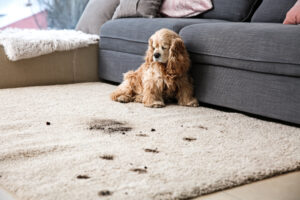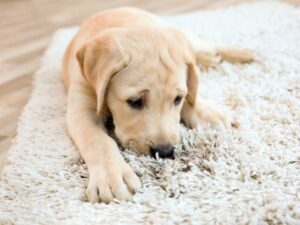Dogs will sometimes scratch at their bedding or the floor when they are ready to lie down. It is a common canine behavior and one that many of us with dogs are familiar with seeing. But why do dogs scratch the carpet? What does it mean?
Dogs scratch the carpet for a variety of reasons. The most likely reason, however, is that they are marking territory. When dogs are outside, they use their paws to scratch the ground, leaving a distinctive scent behind. However, some dogs will also do this in your house to show that they live there.
Also, they scratch when they are getting ready to take a nap or sleep, as a “nesting” behavior. They may not be deep in sleep when they first start and might wake up if they get too comfortable. When this happens, they will re-scratch and settle down again.
If they find that scratching their bed makes it more comfortable, they will do it every time they lie down. Many dogs also use it to cool off in the heat of summer or warm-up on a cold winter’s day.
How do I stop my dog from scratching the carpet?

If your dog is scratching the carpet and furniture, it can be very annoying. This behavior can also lead to expensive repair bills if the scratched area is carpet. The good news is that there are many ways you can deter your dog from this behavior, and many of these involve natural ingredients found in the kitchen.
You can make a scratching post by winding the carpet around a large cardboard tube from a roll of paper towels or bathroom tissue and then placing it on its side. It’s easy to make and relatively inexpensive.
If your dog is scratching in a certain area, spray that area with vinegar. That will soften the carpet and keep your dog away from it. You could even try to cover the area with non-carpet flooring.
You can stop your dog from scratching the carpet by creating barriers, using deterrents, and modifying their behavior. Create barriers in front of areas that you want to protect by placing furniture around these areas. Deterrents are usually sprayed or citronella collars. Whichever deterrent you choose, remember that it will not work if your dog wants to scratch. Modifying behavior may take time and patience.
Ways to stop dog digging home remedy?
Dogs’ instinct is to dig, but there are ways you can curtail this behavior.
If your dog is digging in certain areas, try to put some obstacles such as landscaping timbers, bricks, or potted plants in the way. Try filling holes with rocks and putting large flat stones or fire pit rocks on top of the ground. Your dog will soon get tired of digging when they keep hitting these obstacles.
Also, you can use lemon peels, vinegar, cayenne pepper. The smell of these things makes dogs very uncomfortable. When you drop them in your dog’s favorite digging spots, your dog avoids those spots.
Engage your dogs in fun activities that distract them from digging and scratching.
You may also want to try putting tape or aluminum foil over the scratched areas, and you should also consider taking them to the vet and having their nails trimmed.
Why do dogs kick their legs when you scratch them?
The reason your dog kicks its paws when you scratch it is because that sensation makes him feel good all through his body. Dogs can tell where the legs are being scratched by how the pressure feels on their skin, and it travels up the body, from their back legs to the tummy. Imagine how your whole body feels when you get one of those professional massages on your head, neck, shoulders, and back (higher level).
In addition, he’s telling you he loves what you’re doing. Dogs kick their legs to show how they feel. When we scratch a dog behind the ears, it triggers a nerve that makes the gland below their ear secrete extra hormones into the bloodstream. When they feel good, they kick their legs in appreciation and happiness.
Why do dogs scratch the carpet?
Scratching is a natural dog behavior, so it’s important not to scold or punish your dog for doing it. Instead, redirect your pooch’s attention elsewhere by giving him chew toys and playtime with you.
Dogs can scratch the carpet for a variety of reasons. It might be due to boredom, environmental allergens, or a need for exercise. If you suspect that your dog is scratching because it is boring, increase his physical and mental stimulation with extra walks and games of fetch.
If your dog is allergic to something in or outside of your house, start by vacuuming three times a week and wiping down hardwood floors with damp towels or mops to help remove allergens from his paws.
Why do dogs scratch the floor?
Dogs scratch the floor for a few reasons. Dogs scratch the floor to remove dead and loose hair and epithelialize their nails. A less damaging reason is that dogs do not shed like cats do, making them the only way to redistribute their loose fur.
When they feel the urge to scratch, it’s hard to ignore the instinct. So, if you see your furry friend clawing at your carpet or rug, instead of punishing her, consider it a chance to teach her a new trick – why not teach her to scratch a post instead?
In addition, scratching serves as a form of communication and can even be a type of displacement behavior. As dogs mature and spend more time alone, they tend to spend more time scratching, leading to excessive scratching or even behaviors that are considered compulsive disorders.
Dog scratches are not harmful to hardwood floors, but wood floors suffer damage from pet nails. While many hardwoods can withstand dog scratches, dogs with sharper claws could cause damage to soft and exotic wood floors.
Why do dogs dig in bed?
Dogs dig in the bed for several reasons. Like their ancestors, dogs are still accustomed to digging holes in the ground. This was needed for them to cool down or warm-up. When there are no predators around, dogs still have that instinctive urge to dig whenever they feel uncomfortable. Most of the time, dogs get this urge when they feel cold or hot.
They might also dig whenever they feel itchy caused by insects biting them on the skin or when they are bothered by allergies affecting their feet and dogs seeking to make themselves comfortable because they want something in the bed.
Also, they may be trying to renew a previous scent from an old bed. It is also possible that the new bed is not as soft or comfortable as their old one, and they are trying to make it more comfortable. Dogs dig for several other reasons too, so the diggings could be to try and make a new space just for them.

Why does my dog scratch the carpet?
We all love how adorable dog paws are. But do you know what your little companion is doing when he scratches the carpet?
Some dogs will try to scratch the carpet to get attention, while others do it when they want to play. Other dogs, like greyhounds, will scratch at the carpet because they have such short hair that this is how they generate warmth.
Also, if your dog scratches the carpet, they are likely either attempting to mark their territory or relieve an itch. You can curb this behavior by regularly investing in a scratching post and cleaning your carpets. This will help you prevent damage to the carpet and lessen the urge for your dog to scratch it.
In addition, most dogs are attracted to the texture and aroma of synthetic fibers. Carpet has a similar texture to grass and is often used as grass for artificial lawns. Some dogs will even dig on the spot because they enjoy how it feels.
Why does my dog dig on my bed?
Dogs dig for many reasons. Your dog may dig on your bed to work a scent out of the carpet; you may even notice that she digs whenever you go outside and return home.
Digging on your bed may also be a sign that your dog is bored or anxious. She must have an outlet for her energy. Redirect her boredom or anxiety into positive activities like outdoor play, training, or chewing on toys
Also, your dog’s digging behavior may be a habit, but digging is also his way of cooling off, signaling a change in pack hierarchy, or marking his territory.
Why does my dog scratch my bed sheets?
Scratching is an essential part of a dog’s behavior. It relieves stress, stretches out the muscles, marks territory, and keeps claws in prime condition. You may find that dogs scratch your bed sheets before they settle down to sleep or when they wake up. If a dog is excited to see you, they may also scratch while greeting you.
Sometimes this behavior is rooted in an underlying medical problem or could be a sign of separation anxiety or stress. If you have an older dog, she might be scratching excessively to soothe itchy skin or to relieve arthritis.
Also, if a dog just wants to scratch your bed sheets all day long, he may be trying to get more comfortable and find a better sleeping position. Sometimes it means that he feels cold at night and is trying to insulate himself from the floor.
Furthermore, dogs scratch at things to remove dead skin cells from their claws and mark territory by leaving a visual marker combined with a scent that only other dogs can smell. Scratching also stretches the muscles in front of his shoulders and forelimbs.
Why do dogs dig on beds and couches?
If a dog never did this, it would be unnatural. It’s in a dog’s hard-wired DNA to dig, just like it is with us to kiss or throw Frisbees. Because upholstered furniture is designed to be plush and inviting, soft enough for our bodies to sink into. The scratching motion feels great to your dogs while they are doing it, but the marks they leave behind aren’t so great to look at. A couple of reasons dogs may be digging are
They are relieving an itch. It could also be a reaction to something bothering the dog, such as fleas or an allergic reaction.
They are just marking their territory with scent glands located on their feet.
Your dog may dig simply because he is bored and needs an outlet for his energy.
Why is my dog digging holes all of a sudden?
Dogs will dig for all kinds of reasons, but mostly because they are dogs that have instincts that drive them to act like dogs. If your dog has suddenly taken to digging holes, it could be that he is just trying to change the scent of his environment. As a rule of thumb, we can also assume that dogs generally scratch more when they feel unwell.
He could be bored or stressed. A female dog in heat may also be the culprit. Sometimes it’s difficult to prove whether your dog is scratching the carpet because of an itch or if he is marking his territory.
Such sudden changes in behavior can be extremely stressful for dogs and their owners, so it’s important to find the right solution. The short answer is to get a scratching post or try using a deterrent spray and consult your veterinarian for medical advice.

Why do dogs dig holes when sick?
Some dogs experience an urge to dig when they’re not feeling well or when they’ve overexerted themselves. This is because dogs need a cool place to rest, so digging a hole in the earth helps them feel relief.
In addition, when dogs are sick, they may be eliminating poisons from their body. Digging holes helps them release these toxic substances into the earth. Some dogs dig even if they aren’t feeling sick, too. This often occurs when soil is relatively warm and soft during the summer months. Such dogs need a cool place to lie down and may dig down far enough to create a cool burrow for themselves.
Furthermore, Dogs will dig holes when they feel sick. It is thought by many pet owners to help relieve the pressure on their stomachs and aid in digestion. When you see your dog digging a hole, it’s not too late to treat any parasitic problems he could have. Talk to your veterinarian right away so that you can be sure your dog feels better in no time!
How do you stop a dog from digging holes in yard?
Dog digging is frustrating to those with dogs and those trying to keep a nice yard. There are solutions; however, they all involve making the digging less attractive or less feasible to your dog. Since dogs dig for many reasons, different solutions may be required to stop each dog from digging.
Understanding why your dog may be digging is the first step to preventing them from digging in the future. Dogs can dig for many reasons, such as to hunt for food, to find shade or water, or because they are bored or lonely.
If you do not know the reason for their digging, try and observe them when they do so. You may need to confine them to one area of your house or yard with supervision until you can figure out why they’re digging.
Whenever your dog is digging in the dirt, snow, or mulch in your yard, chances are pretty good that he or she is making a desperate attempt to keep his or her paws and body free from fleas. A dog scratching frequently or excessively may have internal parasites such as fleas, ticks, mites, and lice.
These parasites feed on the dog’s blood and skin, thus causing the dog to scratch himself relentlessly. Keeping the dog healthy with regular veterinary care will help ensure he doesn’t come down with these nasty critters that can wreak havoc on his skin and health.
Also, restrict access to the most destructive areas of your yard. If possible, fence your garden in or keep it under lock and key. Install plastic caps, available at hardware and pet stores, into all holes created by your dog. These caps will fill in the holes but not be big enough for a dog to put its paws into.
One of the easiest ways is to ensure your dog is getting enough exercise and attention. Exercise will help burn out their excess energy, while attention will satisfy their craving for interaction.
What dog breeds dig the most?
Dogs dig for fun and to cool off in the summer. All dogs enjoy a good scratch in the right place at the right time, but some seem to take the pastime to a new level of dedication. Some dog breeds are natural-born diggers.
Dogs that love to dig usually lean towards working or herding breeds, as these dogs use their paws and noses to help them do what they were originally bred to do. Terriers fall into this category. “Terrier” means “earth dogs,” and they were bred to chase rodents out of their holes and for digging.
The Akita, Siberian Husky, and Alaskan Malamute are very large dogs. Even though they are different breeds, they both have one thing in common: long-coated canines. They dig to keep themselves warm in cold weather and to keep cool in warm weather.
Does vinegar stop dogs from digging?
If you have a dog and a garden, odds are your dog has dug up your garden at least once in their lifetime. While dogs are natural to dig, we don’t want them to tear up our gardens.
Sometimes we try to discourage our dogs by using punishment, but this is not effective more often than not. Vinegar is a safe way to keep your dog out of your garden without harming them or damaging the area they’re digging up.
Vinegar can be used as a homemade remedy to keep dogs from digging. Spraying vinegar on the area will mask the scents left by other animals and humans. It repels many pests, including dogs, cats, and skunks.
Vinegar is an exceptionally useful tool in gardening and landscaping design. By combining vinegar with other products, the smell can become more concentrated, especially for dogs that like to dig up the grass.
Although it is safe to use vinegar to repel dogs from a garden, it only works for a short time. A better and longer-lasting method is to set up a motion sensor sprinkler system.
Will coffee grounds keep dogs from digging?
Your dog wants to dig. It’s fun, and it’s instinctive. And they will always be on the hunt for something to satisfy that need. There are certainly ways to discourage them from digging in places where you don’t want them to, and coffee grounds are among them.
Sprinkle used coffee grounds in your garden, on the soil around your plants after a dog has gone digging. The scent from the coffee grounds will keep the dogs out of that area.
Coffee grounds are the leftover products after brewing coffee. They contain different kinds of nitrogen and a small number of other elements (such as magnesium, phosphorus, potassium) that benefit crops by improving plants’ nutrient uptake and growth.
Using coffee grounds will not only keep dogs from digging the ground it will also enhance soil aeration, drainage, and water retention. In addition, they are a good source of organic matter to acidify the soil.
Why does my dog dig up roots and eat them?
Dogs have a habit of consuming things that intrigue them, even when they should not. This may include grass, roots, sticks, toys, and other small items. They also tend to consume earthworms and insects that live in the dirt. A dog digging in the dirt might indicate that they are sick or unhappy in their environment.
In addition, when a dog digs up roots, it is not because it wants to dig or is lonesome. It is trying to eat, and the roots taste good. Dog’s digestive systems are not equipped to digest roots, like tubers such as potato, carrot, turnip, and parsnip. Dogs cannot eat them without serious and even fatal, if untreated, side effects.
These toxic portions of the plant root can cause severe stomach inflammation, vomiting, diarrhea, anorexia, weakness, and liver damage.
How do I stop my dog pulling up the grass?
Puppies and older dogs seem to be the worst culprits for digging. Remember that digging is normal for canines – from a young age, puppies dig in their whelping box to make themselves a soft, comfortable bed. If you want to keep your pup from chewing up your newly seeded lawn or digging up your flowerbeds, however, there are some simple tricks to discourage this behavior.
You might be able to stop your dog from pulling up the grass by providing him with an area to dig and train him to use it. Choose an area far away from your garden. Instead of digging up your grass, give him a little patch of soil that he can call his own. Reward your dog with treats, and over time, he will learn to dig only in his designated area.
Also, provide the digging dog with a digging box in an area where digging is encouraged. You can make a digging box by filling a children’s plastic pool or old sandpit with soft soil and sand.
Not being able to dig is part of a dog’s social development. They learn to respect the rules of your household. If you notice your dog is pulling up grass, this is usually only a temporary issue caused by boredom or anxiety.
You can try to reduce their stress, give them more exercise and interactive activities, supervise them, or even ignore their behavior when digging up your yard!
Why do dogs scratch before lying down?
It is a well-known fact that many dogs will scratch at their bedding or the ground before lying down for a long rest. The purpose of this ritual is not entirely clear, but according to experts, dogs may be protecting themselves from fleas, mites, or other pests by doing so.
One possible cause of this behavior could be that a dog wants to remove the dead outer layer of its claws. This is called a “magnum claw”. It’s a temporary condition and will go away in a couple of days.
The reason for it is that when dogs are active, such as during playtime, the quick beneath their nails doesn’t recede (in most breeds), so when dogs lie down, this short area of the nail is visible.
The quick may irritate the dog’s foot and make it uncomfortable to sleep. Although scratching is not always a sign of concern, it should be checked out by your veterinarian if it occurs suddenly or frequently.
Dogs scratch before lying down because it helps relieve the area of stress and tension and remove dead skin cells. They also do this while stretching out their body to relax and prepare for a nap.
Why is my dog eating grass frantically and panting?
Panting and frantic grass-eating may be caused by various things, including internal parasites, gastrointestinal distress, or as a reaction to food or drugs. You should always consult your veterinarian when you notice these symptoms.
Dogs will eat grass. There are several reasons dogs do this, but the most common reason is to relieve an upset stomach. Some veterinarians believe that dogs may also ingest grass as a source of folic acid or other vitamins.
The best way to stop your dog from eating grass is to not allow them out in the yard without supervision or build a screened porch where they can safely nibble away.
Furthermore, if your dog has suddenly started eating grass and seems very anxious and restless, that probably means he has a case of worms. These are tiny parasites that live in the host’s intestines.
A dog can pick them up by eating a flea or tick in the environment or by drinking water from an infected source such as a pond.
Why does my dog rub his face with his paws?
Pawing or rubbing the face is a common dog behavior. This can occur when your dog is feeling itchy or irritated. Since the paws and claws are the primary means of scratching, this behavior is often used to relieve itching. This is a form of self-help for your dog.
Also, your dog may be rubbing his face with his paws because of an irritant to his face. One possibility is a food allergy.
He may have even developed an allergy to the shampoo you use when bathing him. Another cause may be a muzzle rash caused by too-tight collars that make dogs generally irritated, and so they rub their faces against things in reaction.
Some dogs also dribble urine while they sleep, which can cause them to rub their face to wash off the moisture. It could also be the sign of a foreign object stuck in their paw.

Why does my dog rub his face on my bed?
It’s a mystery why dogs do many of the things they do, but there is a plausible explanation for why your dog might be rubbing his face on your bed.
One of the common reasons a dog may rub their face on your bed is because they want to mark it as their territory. Your dog rubs his face on the bed to transfer their scent onto these items, which helps them feel more at home.
Boredom, anxiety, scent-marking, and dry skin are also the most common reasons dogs do this. The best way to get to the bottom of this behavior is to take your dog in for a veterinary confirmation that he is not suffering from a health issue that requires treatment.
If no illness is present, you’ll want to learn as much as you can about what triggers the face rubbing so you can help him manage his behavior in healthier ways.
Why does my dog roll around on the carpet?
Dogs roll around on the floor for all kinds of reasons. Most commonly, this is a pack behavior that allows dogs to wear the scent of their kind on their coats and become familiar with each others’ scents.
Other reasons can include wanting to remove an odor from the coat, wanting to flirt with another dog by putting his scent on you or another dog, or simply because they are having a good time rolling around in the dirt.
In addition, Dogs roll around on the carpet because they’re extremely happy and love it; it helps clean their sensitive skin. They also do it because a unique spot on your carpet gives them an “overwhelming feeling of happiness” that might not be obvious to you, but it’s there somewhere.
It is also possible that your dog is trying to communicate with you in a non-verbal way. He is trying to tell you something. Dogs roll onto their backs when they want things—attention, a tasty morsel, play, or out of aggression (especially with other dogs).
And that’s just for starters! Rollover can be the show of fear and submission, confidence, or just due to discomfort in their surroundings. It’s very important to determine the why before starting any training.
How to protect carpet from dogs?
Carpet is one of the areas of your home that you can’t afford to have damaged. Everyday dirt and wear and tear can be damaging over time, and dogs are especially bad for carpets because of all the fur they leave behind. To avoid having to part with your rug altogether, follow these easy steps!
- Deter your dogs from chewing and peeing on your carpet. A good way to do this is by using vinegar, citrus fruit peels, etc.
- Vacuum your carpets regularly. This keeps the dog hair out of your carpets.
- You need to trim your dog’s nails regularly. Your dog’s nails can damage your carpet while scratching if this isn’t done.
Conclusion
Now you know all you need to on the topic “why do dogs scratch the carpet?” and how to protect your carpets from a dog scratch. You can now decide on which of the ways to protect your carpet and upholsteries.
Also, once you understand the reasons and the possible solutions for curbing the carpet-scratching habit, it is important to note that it takes continuous training and patience on your part for your dog to break this habit.

